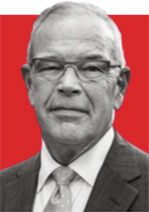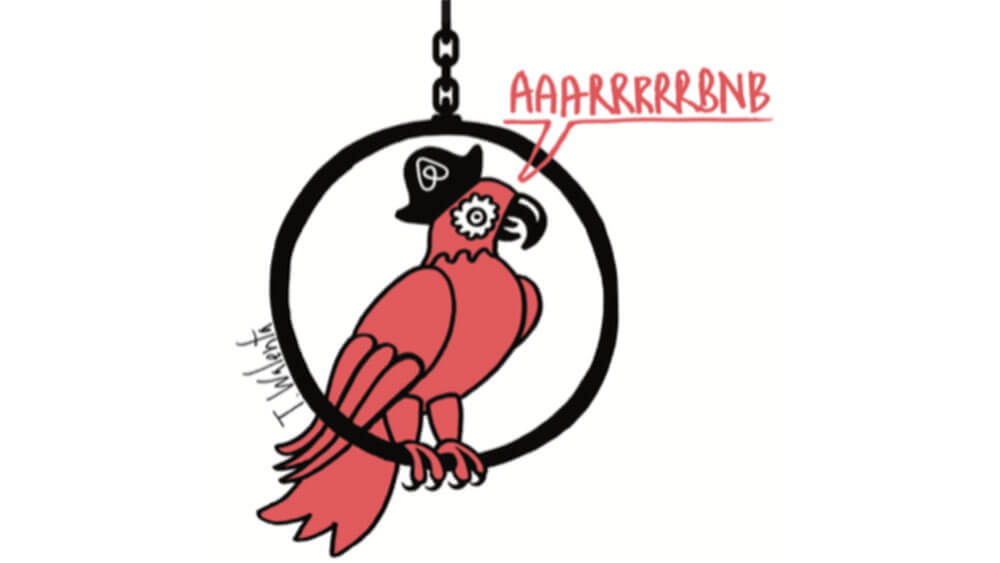When Lisa Mikita, CMP, CAE, started her new job at the American Foundry Society (AFS) this past fall, she had a new office, a new title — trade show and event manager — and new meetings to promote, including CastExpo ’16, AFS’s annual metal-casting exhibition. One aspect of Mikita’s work didn’t change, though. Almost from day one, she has had to deal with third-party companies — sometimes called room-block “poachers” or “pirates” — trying to sell rooms directly to exhibitors and attendees. “I have been at my current job six weeks,” she said, “and have been dealing with housing pirates since my arrival.”

Lisa Mikita
The Illinois-based AFS holds 10 to 20 events a year. CastExpo, which will take place on April 16–19 at the Minneapolis Convention Center, is one of the largest, with roughly 8,000 attendees. Almost as soon as CastExpo’s exhibitor names became public, unofficial housing providers began calling them. “Our list of exhibitors is on our website — anyone can see it,” Mikita said. “The housing pirates have gone through the list, and call exhibitors to make reservations ‘before the blocks sell out!’ These calls were happening when the housing block wasn’t even open.”
Room-block pirates are nothing new; they’ve been around as long as some meeting professionals can remember. And Mikita — who has logged 30 years as a planner — isn’t alone in her long-suffering frustration. A Convene request on PCMA’s Catalyst forum compelled several meeting professionals to get in touch with their own stories, most of which shared a common theme: Although many planners use a legitimate third-party provider as their official housing partner, “unofficial” room-block poachers are multiplying, and their strategies are becoming more sophisticated and aggressive.
And poachers aren’t the only pressure on room blocks, which planners use to gain discounts on meeting space, F&B, and other things. In North America, the size of a room block can be critical in earning those concessions — and the size of a block never seems to match the actual size of an event. Even though 8,000 people are expected at CastExpo, for example, the event’s peak night is only 2,500 rooms. “Everybody’s staying somewhere,” Mikita said. “I just don’t know where.”

Christine Shimasaki
These days, roughly one in three attendees books outside the official room block, according to The Event Room Demand Study: How Many Rooms Does Your Convention Really Use?, a recent report from Tourism Economics that was written by Christine “Shimo” Shimasaki, CDME, CMP, managing director of DMAI’s empowerMINT.com initiative. Those off-the-books bookings can both threaten a meeting’s bottom line and misrepresent its economic impact on a destination. “It is important for public officials, local stakeholders, and the community to understand that the taxes and sales generated by these events impact the local community in a significant way,” Shimasaki said. “It’s a story that needs to constantly be told.”
‘It Hacks the Bottom Line’
Once they pinpoint a meeting, room-block pirates typically reserve blocks of rooms at both official and unofficial hotels, sometimes under false names, and try to sell them to exhibitors and attendees they find listed on event websites. Besides cold calls, some poachers employ scare tactics (“The block is almost sold out — act now!”) or misrepresent themselves as the official housing agency, using the event’s logos on emails, or creating false websites. They often bury complicated practices and cancellation fees in their fine print.

Michael Owen
“The more digital we get, the easier it is to scam people,” said Michael Owen, managing partner at EventGenuity in Nashville, chair of the Convention Industry Council’s APEX Standards Committee, and a member of APEX’s Room Block Poaching Workgroup. Owen once traced a poacher to a “shuttered Chinese restaurant” in Hollywood, and another possible offender to Romania. “The minute you stop them, they figure out another way to get around it,” he said. “While technology has been a boon to us as an industry, it has also been a boon to the bad guys. Even if they’re peeling away a small block of rooms, it hacks the bottom line.”
Both planners and hoteliers can be quick to point out that not all third-party booking firms are necessarily “bad guys”; some are bona fide companies whose activities can be annoying but not illegal. “Some of them are legitimate travel agencies,” Mikita said. “Some of them are real companies that manage to get blocks of rooms at the hotels. Many of them are in business this week and out of business next week. Are some seedy characters? Yes. Are some legitimate? Yes.”
Added Gus Vonderheide, vice president of global sales–Americas for Hyatt Hotels and Resorts: “I want to be careful about this. Our third-party partners are extremely important to us. We do a lot of business with them. We do believe that a relationship with the end user is always important, and we try to find that middle of the road.”
“I believe there is a continuum amongst the ‘pirates,’” said Martin Sirk, CEO of the Netherlands-headquartered International Congress and Convention Association (ICCA), “ranging from total scammers (who may not even have rooms available), through dodgy marketers (making claims to be officially acting on an association’s behalf), to legitimate third-party marketers who see an opportunity to market rooms they either already control or which they are able to acquire legitimately.”
Europe and Asia don’t rely on official housing blocks, according to Sirk, so while poachers aren’t common there, they seem to be proliferating in the United States. “There are more poachers than usual this year,” said Richard Markow, director of Symposia, which holds the annual San Antonio Breast Cancer Symposium (SABCS). “They are targeting attendees in a relatively slick and effective manner. They are becoming smarter and better organized.”
What especially worries Markow is how room-block pirates can affect the perception of his meeting — and, as a result, attendance. “It reflects negatively on you if somebody has a bad experience,” he said. “It has a potential to create a negative image for the organization.”

Pam Ballinger
Pam Ballinger, CMP, senior director of meetings and exhibits for the American Association for Cancer Research (AACR), is dealing with pirates for AACR’s 2016 Annual Meeting at New Orleans Ernest N. Morial Convention Center on April 16–20. “We’re battling them tremendously right now,” Ballinger said. ‘They’re hitting attendees that aren’t savvy, calling up to say, ‘Housing is getting very tight for the AACR meeting.’ Of course, this sends [attendees] into a panic and [the poachers] book their hotel rooms and take their credit card. Oftentimes, their confirmation number isn’t connected to anything.”
Ballinger first dealt with poachers 15 years ago, at a previous job, but thinks they are multiplying — and targeting AACR’s smaller meetings, too. “As the meeting industry has revitalized and it’s a seller’s market, it’s harder to get hotels,” she said. “I tried to talk to our hotel once and they said, ‘You don’t have every single room in the hotel, obviously’” — meaning unreserved rooms are up for grabs for whoever wants to book them. Symposia’s Markow echoes that. “Nine times out of 10,” he said, “hotels are completely ignorant of it. These companies misrepresent themselves [to book rooms], and they’ll find people in hotels who are inexperienced.”
Is that accurate? Michael Dominguez, CHSE, senior vice president and chief sales officer for MGM Resorts International and co-chair of APEX’s Room Block Poaching Workgroup, paints a more complicated picture of how hotels work with third-party bookers. “It’s not that they are necessarily doing anything illegal,” Dominguez said. “[The third parties] are pulling blocks from what we would have had from traditional wholesale operators and trying to resell them.”
But for planners, it all cuts into the bottom line. “I need those room credits,” Mikita said. “I need [attendees] to book through me, so that I can get appropriate credit history.”
 Airbnb, Transparency, and Accurate Room Counts
Airbnb, Transparency, and Accurate Room Counts
Also vying for attendees’ attention (and dollars) are third-party booking sites such as Travelocity and Booking.com; hotel loyalty programs; and, most recently, Airbnb.
But while Airbnb may have initially sent a shiver up the hotel industry’s spine, both planners and hoteliers now seem to think it isn’t the threat they once perceived it to be. “We’ve been talking about bed-and-breakfasts since the 1990s. This behavior isn’t very different,” Dominguez said. “[Its impact] is very small. Airbnb is going to earn $1 billion this year, which sounds huge, but [the hotel industry] will do $140 billion in room revenue in the United States.” Markow added: “I think Airbnb is [for] a different kind of customer. It has never had much of an effect on SABCS’s room block.
More impactful, at least according to The Event Room Demand Study, are meeting size, location, and other basic factors. “No two meetings are alike,” Shimasaki said. “I think what fluctuates and changes are attendee preferences.” Another elephant in the room: It’s a seller’s market. “We have more demand growth than supply growth,” Shimasaki said. “That creates compression. There is greater demand occurring on an event than organizers are willing to block, and planners tend to be risk-averse.”
One of the risks Shimasaki is referring to is attrition — the penalty that planners pay for not filling their room block. “It’s the age-old pressure point,” she said. Vonderheide agrees that planners can be “a little bit shy” when blocking “realistic” packages, “because they are concerned with attrition and other penalties that will affect them if they don’t pick up the right amount of rooms.”
Dominguez thinks planners need to be bolder. “People are blowing through their room blocks today, because they booked room blocks conservatively in a down environment, which they should have,” he said. “We’re now in an environment where the pickup we’re seeing across the board is extraordinary. I think it’s necessary for planners to do a really hard review of where their blocks are. It would behoove the planner to readdress their blocks early, so hotels have the appropriate time to yield any discounts they are going to offer the group.”
For Vonderheide, the transaction around room blocks calls for transparency. “Come in and lay your cards on the table to the property, and really show, Here’s what our group is worth, here’s the bell curve,” he said. “It will help us create a better event for you, because we can make sure there are no surprises, that everybody’s on the same page. There’s got to be a win-win here, right? We’ve both got to walk away feeling good.”
But in a vexing Catch-22, an accurate event history can be elusive when planners don’t have complete numbers on how many room nights their meeting actually generates. “There’s a lot of different factors that start to be included in the conversation,” Shimasaki said. “That’s why documentation of past performance — event reports, or histories — are so important to the equation. Planners can do a lot for themselves if they keep a really good record, because it signals to the supply community that they know what they are doing.”

Jack Chiasson
The room-block model turns on the fact that meeting planners and hotels need each other; the meeting-space-to-guest-room ratio drives room demand. “The reasons hotels invest in meeting space,” Shimasaki said, “is because they need that to drive a certain portion of their occupancy.” And in the seller’s market, “The hotels expect more from you,” said Jack Chiasson, CAE, the CEO of the National Association of Independent Life Brokerage Agencies (NAILBA). “If you say you’re going to give them X number of rooms, you pretty well better give them that number of rooms. They’re not as flexible with cancellations.”
How are planners supposed to know how many rooms they really need? And how can hotels help them, especially when it’s a seller’s market? AACR’s Ballinger swears by audits. “For the hotels, we have in our contracts that we get credit for any rooms booked outside the block [but still within those hotels],” she said. “When the meetings are over, we will do an audit. We give them a registration list, and they’ll audit, and we get credit for all of those rooms booked outside the block.”
Shimasaki offers another solution: comprehensive room-demand analysis on the part of CVBs and planners, which she hopes empowerMINT’s research tools can help fuel. “By having insight into what their event-room demand really is, compared with just what’s captured in the room block,” she said, “[planners] can see the delta of what they’re missing.”
So, How Do You Handle Poachers?
One thing planners are almost certainly not missing: poachers. CIC’s APEX convened the Room Block Poaching Workgroup two years ago; Owen and Dominguez both took part. Their research found an unexpected downside to poaching: Poachers steal not only money but time. “The most impactful thing was the resources it took to deal with it — the time it took away from planning, attending to satisfaction, and brand reputation,” Owen said. “What was surprising to me, too, is how many people were aware of the problem, and how few people were taking steps to address it.”
The workgroup produced tools such as checklists and cease-and-desist letter templates, which Chiasson wrote. “Every time we hear about another group that’s trying to poach hotel rooms or our attendees, [NAILBA] sends out a message to all our attendees, exhibitors, and sponsors,” he said. “We say, ‘Here’s the name of the company that’s the latest idiot. Remember, nobody represents us other than us.’”
But some planners worry that such legal remedies have little effect. Symposia’s Markow has traced pirates to the Philippines, France, and New Delhi. “They are getting [a letter or other warning] from the state of Texas, but that might not always been effective,” Markow said. “If you’re a crook, you’re a crook, and nothing is going to cut any ice with you.”

Davide Veglia
There’s something to that, according to Davide Veglia, founder and president of Miami-headquartered ABTS Convention Services, which represents international delegations for 25 associations — including large contingents of doctors who travel to U.S. medical meetings. “It’s not really easy to enforce anything outside the U.S.,” Veglia said. “Even within the U.S., we know companies that were sued, out of business, and then they reappear like mushrooms out of nowhere.”
ABTS fights fire with fire, at least when it comes to technology. The company maintains an IT team in Belgrade, Serbia, to deal with poachers. “[Poaching] is getting more sophisticated, more bold,” Veglia said. And the stakes are high. “There can be a big sum of money in one transaction, $50, 60, 70 thousand or more. There are money-laundering situations that we have never seen before, and IT is very aware of these new threats.”
At AFS, Mikita publishes a list of room-block poachers on her event website, along with their phone numbers. She calls them herself. “I’ve got one company in particular that I have contacted four times by phone, following up with email, asking them, ‘Please don’t call my exhibitors,’ and they continue to do so,” Mikita said. “It means nothing to them. Their whole deal is to make a reservation and get that credit.”
What’s most important for Mikita, Markow, and others is constant communication with attendees. “We counter very quickly with an educational campaign,” Markow said. “Education of the attendee base is paramount now.” Mikita added: “Communicate with the exhibitors and members again and again and again. Just keep them informed about it. Remind them every time something goes out about housing that this is the only way to make the arrangement.” Even more effective for SABCS — which picks up 95 percent of its contracted rooms — has been the 15-percent registration discount it offers for booking inside the block. “It’s a positive experience for the attendees,” Markow said.
Chiasson urges no quarter for pirates. “Don’t take it sitting down,” he said. “Fight back. Ask the questions. Pick up the phone and call these companies. Get them to admit wrongdoing. It might be a time suck, but once you develop your own set of tools to deal with these morons, it really is fairly simple.”
Block to the Future
Is the room block doomed? “It’s come up numerous times over the past, going back 10 years,” Mikita said. “The challenge is that by securing these room blocks, obviously we get things that we need, like free meeting-room rentals, complimentary rooms I can use for staff and speakers, discounted room rates for staff or speakers. We would lose all of that — five, 10, 15 thousand dollars’ worth of concessions.”
While Dominguez says “the room block will still be around in traditional form,” he thinks what might change is how rooms are priced. MGM Resorts now uses a dynamic pricing system. “This is a much more real rate that helps us manage the block effectively,” Dominguez said. “The problem is, the way we’ve contracted in the past, traditionally there are no steps to reevaluate and move the rate either up or down, depending on what market conditions are telling us.”
If the idea of constantly shifting hotel rates stresses you out, Dominguez offers this comfort: “If my rate is too expensive, they are not going to fill the block. I just want to be able to fill a room. The same concerns that the planner has, I have.”
Illustrations by Tomasz Walenta
Test Time
Earn two hours of CEU credit. Once you’ve finished reading this article, read the following material:
- The Event Room Demand Study: How Many Rooms Does Your Convention Really Use?, a Tourism Economics report written by Christine Shimasaki, CDME, CMP.
- “Best Practices for Piracy and Poaching Prevention and Responses,” a checklist from CIC’s APEX Room Block Poaching Workgroup.
- To earn CEU credit, visit pcma.org/convene-cmp-series to answer questions about information contained in this CMP Series article and the additional material.
The Certified Meeting Professional (CMP) is a registered trademark of the Convention Industry Council.>

